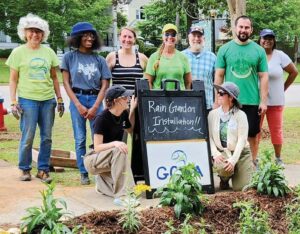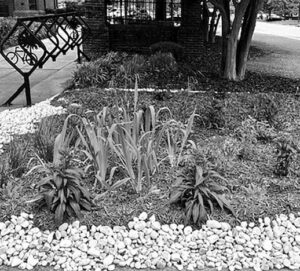Mother Nature created the first rain gardens. Before humans changed the landscape—rain was filtered through soil, roots ,and plants in native forests, wetlands, and meadows. Most of the water that entered the streams was cool, clean groundwater.
Natural water-cleaning systems were gradually removed as homes were built, roads and infrastructure were added, and these manmade structures multiplied. Streams and rivers became increasingly degraded as water ran off the land instead of being taken up by plants, soaking into the soil, and being filtered by natural processes.
Rain gardens, first called bioretention areas, were conceived in 1990 by stormwater specialists in Maryland. The goal was to design a practice to mimic naturally occurring functions that help filter rainwater.
The Gills Creek Watershed Association (GCWA), a local conservation based group with a long list of educational and interesting projects, has been offering local citizens an opportunity to learn how to install such an area in their yards through its Rain Garden Seminars.
Ella Harper, Gills Creek Watershed Association’s intern in charge of the Watershed Champions Program, is not only a force for nature but is quickly becoming a force of nature. She recently sat down with Jessica Daly, manager of Richland Library, Wheatley. GCWA’s Bailey Parker and Taylor Caughman, Wheatley’s children’s librarian, were also present. The group discussed ways Richland Library could publicize the GCWA Champions Program and other partnering possibilities.
The two organizations had already partnered in one of Wheatley’s Little Sprouts programs—a children’s event that includes story time and planting something at the library. At this particular program, they planted the shade tree Taylor got from another Columbia program called Beat the Heat.
While the four discussed various ways to partner and help publicize the Champions Program, Ella shared the steps involved to become a Champion. Jessica got excited about the library doing some of those things that would make the Wheatley neighborhood cleaner and safer. The meeting moved outside as the group looked for rain garden possibilities. A spot was located and plans were made. Bailey and Ella also held an adult education program called Rain Gardens 101 the Thursday before the garden installation.
On May 3, GCWA members, along with nearly 30 volunteers including library staff members Taylor Caughman and William Small, who both have an interest in gardening and were absolutely instrumental in the installation, gathered at Wheatley to install a rain garden for local residents to see and enjoy—and perhaps decide they want one for themselves.
This rain garden is situated to catch stormwater runoff, which it can then collect, filter out pollutants, and infiltrate the water into the soil. The native plants within this garden will help with any erosion issues, support wildlife, and create a beautiful landscape on what was otherwise a patch of grass. It presents a part of the natural space that is much more pleasing to one’s eye than sod—and no one has to mow it.
Thanks to help from volunteers and staff from both organizations, the rain garden is already a success in managing the runoff at Richland Library Wheatley after less than a week. ReSoil Compost, SiteOne Landscape Supply, Mill Creek Greenhouses, and Solid Ground Landscape Supply are local businesses where rain garden materials can be found.
GCWA Director Bailey Slice Parker said, “Seeing the community come together to build this beautiful and functional rain garden at Richland Library Wheatley is truly inspiring. It is a testament to the power of collective action in protecting our waterways. We are incredibly proud of this collaborative effort and look forward to seeing the positive impact it will have for years to come.”
Daly said, “Richland Library Wheatley is so proud to have our new rain garden as a symbol of our commitment to our neighborhood and to showing that we are good stewards of our environment. It’s a testament to our amazing customers who literally put their hearts, souls, and sweat into making it happen, and it highlights our commitment to sustainability, community education, and environmental stewardship.”
The rain garden is situated so anyone walking the neighborhood, and those driving by, can’t help but see it. Anyone looking a little closer can visualize a vivid example of gathering together for a great cause.
Plans were also discussed about GCWA participating in the annual Summer Learning Challenge Kick-Off at Wheatley, which is a big outdoor event with activities and crafts on Monday, June 2 at 3 p.m.
Funding for the project was provided in part by a Natural Resource Grant from the Richland County Conservation Commission. For more information, visit www.gillscreekwatershed.org www.clemson.edu/extension/raingarden www.richlandlibrary.com/locations/wheatley.





Loading Comments